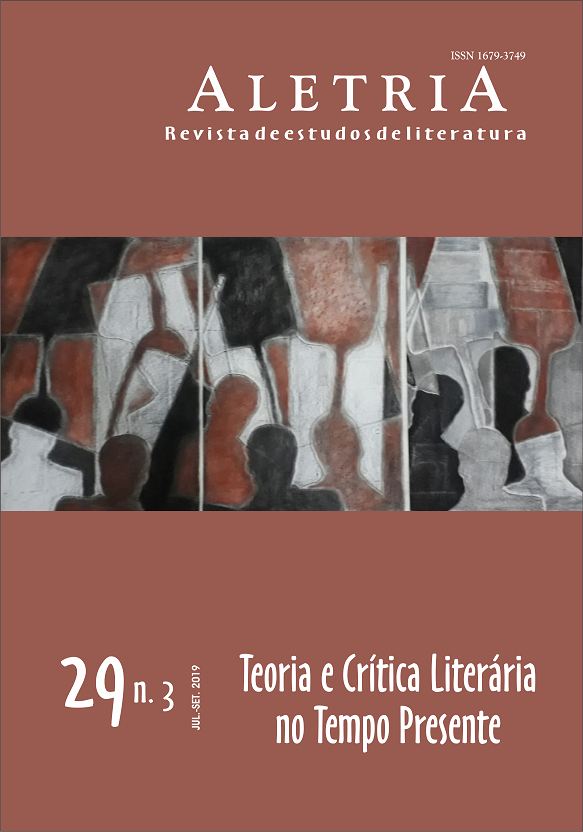The Return of Bartleby and the Crisis of Alocratic Interpretation
DOI:
https://doi.org/10.17851/2317-2096.29.3.39-60Keywords:
Hermeneutics, poetics, alocratic and autocratic interpretations, Bartleby, the ScrivenerAbstract
Major critics and philosophers of the Age of Theory (1965-1980) developed as an alternative to the hegemonic practice of interpretation the study of a poetics that, by rigorously describing the mechanisms of meaning production, would contribute to make hermeneutic practices more precise. Partially discarded as of little relevance, these studies offered, nevertheless, relatively important contributions to the development of new forms of understanding literary texts not restricted to the traditional hermeneutic practice. Agamben’s reading of Melville’s tale, Bartleby, the Scrivener, forcefully illustrates one of these new forms of understanding and the possible problems related to it.
References
AGAMBEN, Giorgio. Bartleby, ou da Contingência. Tradução de Vinícius Hoensko. Belo Horizonte: Autêntica, 2015.
AGAMBEN, Giorgio. La comunità che viene. Torino: Giulio Einaudi Editore, 1990.
ATTEL, Kevin. Potentiality, Actuality, Constituent Power. Diacritics, Baltimore, v. 39, n. 3, p. 35-53, 2009. Doi: https://doi.org/10.1353/dia.2009.0023.
BARTHES, Roland. O que é a crítica? In: BARTHES, Roland. Crítica e verdade. Tradução de Geraldo Gerson de Souza. São Paulo: Perspectiva, 1970, p 157-164.
BERKMAN, Gisèle. L’Effet Bartleby: Philosophes Lecteurs. Paris: Hermann Éditeurs, 2011.
CULLER, Jonatham. The Pursuit of Signs. London: Routledge, 2001.
DE MAN, Paul. Blindness and Insight. Minneapolis: University of Minnesota Press, 1971.
DELEUZE, Gilles. Crítica e clínica. Tradução de Peter Pál Pelbart. São Paulo: Editora 34, 1997.
EAGLETON, Terry. After Theory. New York: Basic Books, 2003.
FORSTER, Edward Morgan. Aspects of the Novel. New York: Harcourt, Brace and Company, 1927.
HARDT, Michael; NEGRI, Antonio. Empire. Cambridge: Harvard University Press, 2000.
HIRSCH, Eric Donald. The Politics of Theories of Interpretation. Critical Inquiry, Chicago, v. 9, n. 1, p. 235-247, set. 1982. Doi: https://doi.org/10.1086/448197.
MARX, Leo. Melville’s Parable of the Walls. The Sewanee Review, Sewanee, v. 61, n. 4, p. 602-627, 1953.
MELVILLE, Herman. Bartleby, o Escrevente. Tradução de Bruno Gambarotto. São Paulo: Grua Livros, 2014.
MILLER, Joseph Hillis. Deconstructing the Deconstructers. Diacritics, Baltimore, v. 5, n. 2, p. 24-31, 1975. Doi: https://doi.org/10.2307/464639.
POE, Edgar Allan. The Man of the Crowd. In: MABBOT, Thomas Ollive (ed.). Collected Works of Edgar Allan Poe. London: Belknap Press, 1978. p. 506-518.
TALLY, Robert T. Reading the Original: Alienation, Writing, and Labor in “Bartleby, the Scrivener”. In: BLOOM, Harold. Alienation. New York: Chelsea House, 2009. p. 1-10. (Bloom’s Literary Themes).
Downloads
Published
Issue
Section
License
Copyright (c) 2019 Sérgio Luiz Bellei (Autor)

This work is licensed under a Creative Commons Attribution 4.0 International License.
Authors who publish with this journal agree to the following terms:Authors retain copyright and grant the journal right of first publication with the work simultaneously licensed under a Creative Commons Attribution Non-Commercial No Derivatives License that allows others to share the work with an acknowledgement of the work's authorship and initial publication in this journal.Authors are able to enter into separate, additional contractual arrangements for the non-exclusive distribution of the journal's published version of the work (e.g., post it to an institutional repository or publish it in a book), with an acknowledgement of its initial publication in this journal.Authors are permitted and encouraged to post their work online (e.g., in institutional repositories or on their website) prior to and during the submission process, as it can lead to productive exchanges, as well as earlier and greater citation of published work (See The Effect of Open Access).





